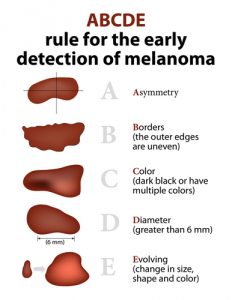
Skin Checks and Early Detection
- Early detection of skin cancer saves lives.
- Self Assessment and Specialist Full skin examination are both important in Early detection
- Dermatologists are specialist medical doctors who are experts in the diagnosis and treatment of skin cancer and skin disease.
THE SPECIALIST FULL SKIN EXAMINATION
Dermatologists are specialists in skin cancer detection and treatment.
During a Full skin examination you will be asked to undress to your underwear.
Dermatologists use lighting and magnification to examine your skin.
During a skin check by your Dermatologist they will be looking for
- Sign of sun damage
- Actinic Keratoses
- Basal Cell Carcinoma
- Squamous Cell Carcinoma
- Melanoma
TIPS FOR YOUR SKIN CHECK APPOINTMENT
- Ask your parents and siblings if they have had any skin cancers treated, this history is important. List your own personal history.
- Your Dermatologist will ask you if there are any lesions you are concerned about . List the lesions you have noted.
- Please do not wear heavy make up to your skin check appointment. The Dermatologist will need to remove this to accurately assess your skin. If Makeup is important , schedule an appointment at the end of a day.
- To perform a full skin examination you will be asked to undress down to your underwear. A limited examination may be provided on request.
HOW OFTEN SHOULD I GET MY SKIN CHECKED
This depends on a number of risk factors.
See the article below from the Australian Family Physician which outlines the risk factors and suggested frequency of skin checks.
Skin checksYour Dermatologist is a specialist in early skin cancer detection.
See your doctor for a referral to a Dermatologist today.
PATIENT SELF ASSESSMENT
Signs that may indicate a lesion requires assessment
- Persistent Itching or painful lesions
- Non healing ulcers or sores
- Areas of skin that bleed intermittently without cause
- Any lesion that stands out from the others ie the “ugly duckling “ .
Any sign of potential melanoma should be assessed immediately by a medical professional for appropriate treatment.
When self examining moles look for:
| A. | Asymmetry | — one half doesn’t match the other |
| B. | Border | — edges are ragged or blurred |
| C. | Color | — uneven shades of brown, black, tan, red, white or blue |
| E. | Diamete r | — a change in size |
| F. | Evolution | — look for changes in size shape or colour |



